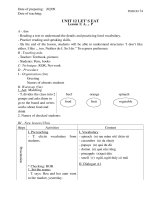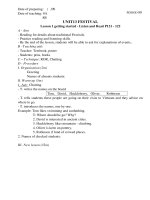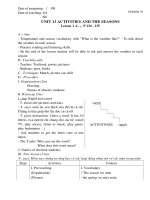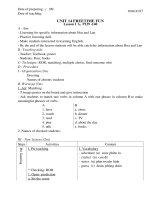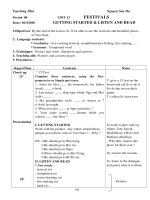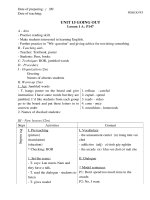GA 7 Unit 13
Bạn đang xem bản rút gọn của tài liệu. Xem và tải ngay bản đầy đủ của tài liệu tại đây (111.7 KB, 14 trang )
Date of preparing: / /09
Date of teaching:
Period 81
Unit 13 activities
Lesson 1 A
1
P129
A - Aim
- Reading for comprehensions and sports vocabulary
- Practice reading and speaking skills.
- By the end of the lesson, students will be able to read for comprehension and sport
vocabulary
- Make students interested in learning English.
B - Teaching aids.
- Teacher: Textbook, posters, pictures
- Students: Pens, books
C- Technique. Guessing game, ROR
D - Procedure
I - Organization (2m)
Greeting
Names of absents students
II. Warm up (5m)
1. Act: Guessing game
- T. divides the class into 2 groups
- T. gives instruction:
- T. asks student from group by group ask them to sit on the chair so that don't see the
picture, ask a student in the same group look at the picture and describe and ask
students sit on the chair to guess the sport.
(play football, play table tennis, walking, skip …)
- T. checks and praises the winners.
2. Names of checked students:
III - New lesson (32m)
Steps Activities Content
Pre reading
I. Pre teaching
(picture)
* Checking: ROR
I. Vocabulary
- skate - boarding (n) trît v¸n
- roller - skating (n) trît pa tanh (gi©y 4
b¸nh)
- roller - blading (n) trît pa tanh (giÊy 1
b¸nh)
- surprising (adj ) / surprisingly (adv )
Ng¹c nhiªn
While reading Post reading
1. T/F statements
a. Set the scene: There is a survey
about sports. Students in
American like. There are
information's about it
- Ask students to guess If it true
or false
- T. shows the poster on the board
and runs through
- Let students to copy down the
table and guess in 3 minutes
- Ask students to read A1 P129
and check their predictions.
- Write the questions on the board
and runs through and ask students
to read the text again and answer
the questions
* Mapped dialogue
- Ask students to work in 2
groups
- T. uses the pictures to elicit the
model
- Ask students to practice in pairs
* Poster
1. The survey has some surprising results.
2. Baseball is the most popular in the USA.
3. Baseball is the most popular games in the
world.
4. Soccer is at six positions.
5. Many teenagers like table tennis.
Key: 1. T 2. F 3.F 4. T 5. T
* Comprehension question
1. What's the most popular sport in the
USA?
2. Which sport is at 11
th
position?
Lan
What is your favorite sport?
Do you like table tennis? (picture)
I like football.(picture)
Ba
My favorite sport is swimming. (picture)
No, I do not. I like tennis. (picture)
What about you?
IV - Summary (2m)
- Repeat the content of the lesson
V - Homework (5m)
- Learn vocabulary, read the text again
- Prepare Unit 13 lesson 2 A4- Vocabulary, write the answer the questions. P132.
E - Evaluation
……………………………………………………………………………………………
……………………………………………………………………………………………
……………………………………………………………………………………………
……………………………………………………………………………………………
Date of preparing: / /09
Date of teaching:
Period 82
Unit 13 activities
Lesson 2 A
4
P132
A - Aim
- Reading for comprehensions and sports vocabulary
- Practice reading skill.
- By the end of the lesson, students will be able to read for comprehension and sport
vocabulary
- Make students interested in learning English.
B - Teaching aids.
- Teacher: Textbook, pictures
- Students: Pens, books
C- Technique. Net work, ROR
D - Procedure
I - Organization (2m)
Greeting
Names of absents students
II. Warm up (5m)
1. Act: Net work
- T. divides the class into 2 groups
- Ask students to go the board and write
vocabulary.
- T. gives example on the board
- Let's go to the board and write in 3
minutes
- T. checks and praises the winners.
soccer
swim
2. Names of checked students:
III - New lesson (32m)
Steps Activities Content
Pre reading
I. Pre teaching
(when can we get gold medal)
(translation)
(explanation)
(translation)
(trans)
(explanation)
* Checking: ROR
I. Vocabulary
- won the first prize (v)
- organize (v)
- competition (n)
- participant (n)
- ability (n)
- walking competition (n)
II. Text A4 - P129
Popular sports in the USA
and Vietnam
While reading
1. T / F statements
a. Set the scene:
- Ask students to look at pictures
- T. asks
Who are they? St: They are
students.
What is the name of the sport?
St: Walking (§i bé)
- T. hangs poster on the board and
runs through
- Checks the meaning if it has
- Ask students to copy down the
letters and guess which are T/ F
- T. collects students' ideas on the
board
- Ask students to read the text and
check their predictions
- T. explains: Many students like
walking so they organize a club
call "WFF". T. asks
What is "WFF"?
What is "WTS"?
- Ask students to answer
* Matching
- T. hangs poster on the board and
gives instruction: Ask students to
match one word in column A with
suitable meaning in column B.
- Ask students to go to the board
and match.
* Comprehension questions P132
- T. runs through all the questions
and check the meaning
- Ask students to read the text and
write these answers in 5 minutes
- Ask one by one student to
answer the questions
* Poster
1. The writer participates in walking.
2. The writer's school team won the second
prize.
3. The regular activity of the club is 5km
walk to the beach.
4. Members living far from school volunteer
to take a walk instead of taking motorbike
or bicycle trips every Wednesday
*Key: 1. T 2.F 3. T 4. F
- WFF: Walking For Fun - §i bé thó vÞ
- WTS: Walk - To - School - Ngµy ®i bé ®Õn
trêng
A
1. Therefore
2. increase
3. member
4. instead of
5. volunteer
B
a. t×nh nguyÖn
b. thay v×
c. v× thÕ
d. t¨ng
e. thµnh viªn
* Answer key:
a. He takes part in walking for fun /
walking.
b. The writer's school team won the first
prize; they were so happy and wanted to
keep the activity.
c. One activity is 5 km walk / walking 5 km
to the beach on Sunday morning and other
walk to school day.
d. It is 5 km.
e. Wednesday is the WTS day.
Post reading
* If has time ask students
complete the summary
- T. gives exercise for students
and gives instruction ask students
use the words in the box to fill in
the gaps.
f. Members living near school take part in
the WTS day.
* Complete the summary
(won, fun, walking, school, competition)
The club"(1) …… For Fun" at my school
(2) …… the first prize in the district walking
(3) …… last year. The 2 activities of the club
are a walk - to - (4) ………… day a 5 km
walk to the beach on Sunday morning.
Walking is (5) …, easy and inexpensive
activity and it is suitable to everybody.
Key: 1. Walking 2. won 3. competition
4. school 5. fun
IV - Summary (2m)
- Repeat the content of the lesson
V- Homework. (5m)
- Learn vocabulary, write these answers the questions on the notebook, and complete the
summary in their book.
- Prepare Unit 13 lesson 3 A3 - 5- Vocabulary, adjectives and adverbs.
E - Evaluation
……………………………………………………………………………………………
……………………………………………………………………………………………
……………………………………………………………………………………………
……………………………………………………………………………………………
Date of preparing: / /09
Date of teaching:
Period 83
Unit 13 activities
Lesson 3 A
3 - 5
P131 - 133
A - Aim
- Practice in using adjectives and adverbs to talk about sports.
- Practice reading and speaking skills.
- By the end of the lesson, students will be able to use the adjectives and adverbs to talk
about sport fluently.
- Make students interested in learning English.
B - Teaching aids.
- Teacher: Textbook, pictures, cards, poster
- Students: Pens, books
C- Technique. Pelmanism, Matching Word cue drill
D - Procedure
I - Organization (2m)
Greeting
Names of absents students
II. Warm up (5m)
1. Act: Pelmanism
- T. ticks the cards on the board so that
students can see the numbers (12 cards)
- T. divides the class into 2 groups and
named them
- Give instruction: ask students from each
group to choose 2 numbers in turns. T.
turns over the cards at a time and sees if
the match, they will get 1 mark. If not T.
turns the cards over again and ask the next
group to choose
- T. checks and praises the winners.
slow safe
quick clear
good skillfully
quickly clearly
slowly skillful
safely well
2. Names of checked students:
III - New lesson (32m)
Steps Activities Content
I. Pre teaching
- T. elicits vocabulary from
students
I. Vocabulary
- Careful (adj) carefully (adv) cÈn then
- good well giái
- quick quickly nhanh
- safe safely an toµn
Presentation Practice
- Let students copy down.
* Checking: Matching
- T. hangs poster on the board and
divides the class into 2 groups
- Ask students to match one
adverb with suitable meaning
1. Presentation text A3 - P131
a. Set the scene:
- T. says: Trong 1 cuộc thi bơi
Hoa là ngời bơi về sau cùng.
Hoax là ngời bơi nhanh hay bơi
chậm
- T. gives model on the board
- T. asks students some questions
Slow is adverb or adverb?
- T. reminds " slowly"
- Ask students to listen 2 times
Up or down?
* Word cues drill
- T. shows and runs through all
the cues
- T. gives model (cues 1, 2)
- T. speaks sentence 1
Students - sentence 2
Exchange (cue 3)
- Half - Half (4 -5)
- Open pair (3 cues)
- Close pairs.
* Nought and Crosses
- T. hangs poster on the board
- T. divides the class into 2 groups
- skillful skillfully khéo léo
- bad badly tồi
- Slow slowly chậm
A
chậm
khéo léo
tồi
giỏi
nhanh
an toàn
cẩn thận
B
carefully
well
quickly
safely
skillfully
badly
slowly
C
khéo léo
chậm
giỏi
tồi
an toàn
cẩn thận
nhanh
II. Text A3 - P131
Model
1. She is a slow swimmer.
2. She swims slowly.
* Concept checking
- "Slowly" là trạng từ đợc thành lập từ tính
từ bằng cách thêm đuôi "ly"
- Đây là cách thầnh lập của trạng từ chỉ thể
cách
- Trạng từ bổ nghĩa cho động từ đừng trớc
- Ues: Dùng để diễn đạt: Ai đó làmviệc nh
thế nào?
- Intonation: down
1. She / slow / swimmer
2. She / bad / tennis player
3. He / good / soccer player
4. He / quick / runner
5. He / skillful / volleyball
Example exchange:
1. She is a slow swimmer.
2. She swims slowly.
Further Practice
(one group say 2 sentences) I/ slow/
swimmer
He/ quick /
runner
he/ good/
soccer player
She / skillful/
tennis player
He/ careful/
driver
He/ good
volleyball
player
I / quick/
runner
She/ safe/
cyclist
She/ bad /
tennis player
IV - Summary (2m)
- Repeat the content of the lesson
V- Homework. (5m)
- Learn vocabulary; do exercise A5- P133.
- Prepare Unit 13 lesson 4 B1- Vocabulary, Model verb: Should + V.
E - Evaluation
……………………………………………………………………………………………
……………………………………………………………………………………………
……………………………………………………………………………………………
……………………………………………………………………………………………
Date of preparing: / /09
Date of teaching:
Period 84
Unit 13 activities
Lesson 4 B
1
P134
A - Aim
- Listening to a text about an invitation and practice in "Model verbs" (can/should/ ought
to, must).
- Practice listening and speaking skills.
- By the end of the lesson, students will be able to use practice in "Model verbs" (ought
to, must, and should).
- Make students interested in learning English.
B - Teaching aids.
- Teacher: Textbook, poster
- Students: Pens, books
C- Technique. Words square, Matching, ROR
D - Procedure
I - Organization (2m)
Greeting
Names of absents students
II. Warm up (5m)
1. Act: Pelmanism
- T. ticks the poster on the board
- Divide the class into 2 groups and ask
students from each group to go to the
board and circle the words they find
- Let's do in 3 minutes
* Key:
table tennis,
can, should, eat
brush teeth
after, before, meals, adult, swim, thin
T A E H T E E
A F T E R T H
B E F O R E H
L D L U O H S
E M E A L S U
T H I N A C R
E A D U L T B
N N I S W I M
2. Names of checked students:
III - New lesson (32m)
Steps Activities Content
Presentation Practice
I. Pre teaching
(translation)
(visual)
* Checking: ROR
1. Presentation dialogue
- T. model - Students repeat
- T. elicits model sentences
- T. asks students some question
What comes after "should"
after" ought to" &" must"
* Word cues drill
- T. runs through all the cues
- T. gives model - students repeat
- Then ask students to practice
speaking in pairs
I. Vocabulary
- ought to (v) Ph¶i
- must (v) ph¶i
- table tennis paddle (n) vît bãng bµn
II. Dialogue
Model sentence
P1: What should Nam do before he plays
table tennis?
P2: He ought to do his homework.
He must do his homework.
* Concept check:
- Form:
Ought to + V
Must + V
- Mean: Ai ®ã ph¶i lµm g×
- Use: Ought to, must: can be used as
auxiliaries verbs.
1. Nam / before / table tennis
do homework
2. We / after meals
brush teeth
3. Children / when swimming
swim with an adult
Further practice
Example exchange
P1: What should you do after you
have meals?
P2: I should brush my teeth.
- Complete the passage with the
modal verbs in the box.
- T. runs through all the modal
verbs and asks students to read
the passage and complete.
4. Lan / when / very thin
eat more
III. B4 - P137
Key:
1. Can
2. Must
3. must not
4. Should
5. Can
6. ought to / should
7. Can / should
8. should / must
IV - Summary (2m)
- Repeat the content of the lesson
V- Homework. (5m)
- Learn vocabulary; do exercise A5- P133.
- Prepare Unit 13 lesson 5 B2- Vocabulary, Model verb: Should + V.
E - Evaluation
……………………………………………………………………………………………
……………………………………………………………………………………………
……………………………………………………………………………………………
……………………………………………………………………………………………
Date of preparing: / /09
Date of teaching:
Period 85
Unit 13 activities
Lesson 5 B
2
P135
A - Aim
- Further practice in making, accepting and refusing an invitation, using Modal verbs
- Practice speaking skills.
- Make students interested in learning English.
B - Teaching aids.
- Teacher: Textbook, poster
- Students: Pens, books
C- Technique: Mimi game
D - Procedure
I - Organization (2m)
Greeting
Names of absents students
II. Warm up (5m)
1. Act: Mime game (Language focus 5 2c P163)
- T. mimes, ask students tp give advice
- T. gives example: T - Cold
St: You should / ought to stay inside.
You should not go out.
- T. uses the word "sick"
St: You should go to the doctor.
2. Names of checked students:
III - New lesson (32m)
Steps Activities Content
I. Presentation dialogue
- T. presents the dialogue
- Ask students to listen and read
- Ask students to practice the
dialogue using the cues given in
the box.
- Runs through all the cues in the
box - P135
- T. gives example
- Ask students
I. B2 - P135
Ba: Come and play basketball, Nam?
Nam: I am sorry. I don't think I can.
Ba: That's too, bad why not?
Nam: Well, I should clean my room.
Ba: Can you play on Friday.
Nam: Yes, I can.
Ba: All right, see you at seven.
Nam: Ok, bye
Nam: Bye
- Ask students to make their own
dialogue, using 3 bootom pictures
P135
- T.gives example exchange
* Example exchange:
P1: Come and play a game of tennis?
P2: I am sorry. I don't think I can.
P1: Why not?
P2: I must prepare for the test tomorrow.
P1: Can you play on Tuesday?
P2: Yes, I can.
P1: All right, see oyu at 3 o'clock then.
P2: Ok, bye
P1: Bye
IV - Summary (2m)
- Repeat the content of the lesson
V- Homework. (5m)
- Learn vocabulary; learn all modal verbs.
- Prepare Unit 13 lesson 6 B3- Vocabulary, Do T/ F Statements P137
E - Evaluation
……………………………………………………………………………………………
……………………………………………………………………………………………
……………………………………………………………………………………………
……………………………………………………………………………………………
Date of preparing: / /09
Date of teaching:
Period 86
Unit 13 activities
Lesson 6 B
3
P136
A - Aim
- Reading comprehension and using "Couldn't" for part ability.
- Practice reading and speaking skills.
- Make students interested in learning English.
B - Teaching aids.
- Teacher: Textbook, poster, grids
- Students: Pens, books
C- Technique: ROR, Grids, Answer given, T/F statements
D - Procedure
I - Organization (2m)
Greeting
Names of absents students
II. Warm up (5m)
1. Act:
- Ask students to go to the board and write the vocabulary
2. Names of checked students:
III - New lesson (32m)
Steps Activities Content
Pre reading While reading
I. Pre teaching
- T. elicits vocabulary from
students
* Checking: ROR
1. Set the scene:
- T. asks students
Have you ever been under water?
- T. hangs poster on the board and
runs through
- Ask students to gues which are
T/ F
- Ask students to read the text and
check their prediction
- Ask students to read the text
again and answer the questions
- T. hangs poster on the board and
runs through
- Ask students make questions
depending on the answers
- Ask students to work
individually
I. Vocabulary
- under water (v) dới nớc
- scuba diving (n) lặn có sử dụng bình dỡng
khí
- vessel (n) tàu, thuyền
- explore (v) thám hiểm, khám phá
- invent (v) phát minh, sáng chế
- invention (n) sự phát minh
- special breathing equipment (n) dụng cụ,
thiết bị thở đặc biệt
II. Text B3 - P136
* Poster
1. Most of the world's surface is land.
2. Before the invention of special breathing
equipment, man could not swim freely
under water.
3. Now, Scuba diving is a popular sport
4. Jacque Cousteau invented the special TV
caneras.
5. We can learn more about the under sea
world thank to Jacque Cousteau's invention.
* Key: 1F, 2T, 3T, 4F, 5T
* Answer given
a. 2 minutes
b. a long time
c. 1997
d. the early 1940s
e. underwater life
f. with special Tv cameras
* Answer key
a. How long could a peal diver stay
underwater?
b. Now, how long can a diver stay
underwater?
Post reading
* Grids:
- T. draws the table on the board
and runs through
c. When did Jacques Cauteau die?
d. When did he invent the deap sea diving
vessel?
e. What could he study?
f. How can we explore the oceans now?
Invention Verbs Sentences
- Special breating
equipment
- Explore the
oceans
- Learn about
the sea
- Before special breathing equipments, we
couldn't explore the oceans. We couldn't
learn about the sea.
- Electricity
- Read al
right
- Watch TV
- Use
computers
- Listen to
music
IV - Summary (2m)
- Repeat the content of the lesson
V- Homework. (5m)
- Learn vocabulary; write question again
- Prepare Unit 14 lesson 1 A1- Vocabulary, Do Multiple choice P140
E - Evaluation
……………………………………………………………………………………………
……………………………………………………………………………………………
……………………………………………………………………………………………
……………………………………………………………………………………………


